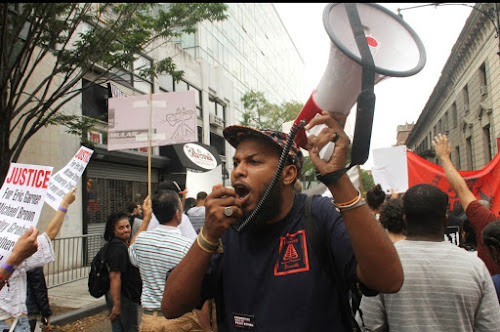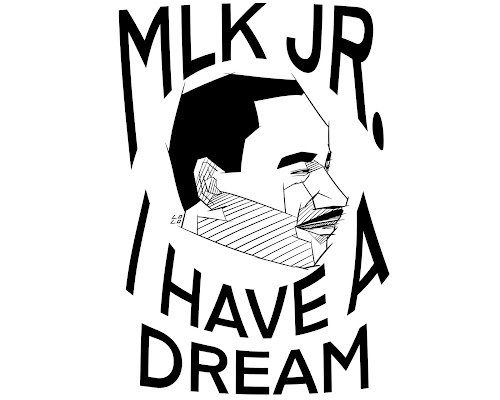My name is Julien A. Terrell and I was born and raised in Harlem, New York where I first developed my passion for social justice and popular education. Every since I can remember, I’ve been obsessed with the history of Harlem and the leaders like Malcolm X, Yuri Kochiyama, Langston Hughes, Charles Alston and Georgia Seabrooke who have all spent time walking the same streets and using their creativity and love for the people to guide their efforts. When I was young, I’d love to read of the many version of my community that still existed in my elders’ memories and believed that my role was to carry on this tradition. A unity between arts, culture and revolutionary imagination that driven work even when I left the area.
In 2004, I began organizing on issues of gentrification and environmental justice in Buffalo, NY where my Dad is from and I first learned the importance of working in inter generational spaces. When I was in school at the University of Buffalo, I was granted the opportunity to work alongside some fierce women who had Lupus ( which my Mom and Aunt had also been battling with at the time)and knew that it had been connected to the fact they lived in between 3 old lead facilities that had been left without any signage or notice to residents in East Buffalo. It was the first time I was able to use some of the technical knowledge I had been learning as an Environmental Studies student to a urgent feeling of wanting to connect with my people directly and hear their stories while engaging them in efforts to fight for clean up of the sights. I didn’t know what Organizing was at the time, believed that going door to door and talking to residents along East Ferry where the worst of the facilitates was located, was the best and most accountable way to be moving in someone else’s community. In time, we were able to win the campaign and it became an experience that I’ve referenced since. The importance of human connection and creating space for others to lead became themes that I wanted to learn how to do more intentionally.
After returning to New York City in 2007 , I was able to use the lessons from organizing on environmental issues in Buffalo to connecting this work to the preservation of cultural and community spaces. My understanding of culture and how our people relate to each other sharpened and I began to view gentrification in deeper way not only as a problem that changes communities but also impacts how people especially children and youth learn about their own communities. Through organizing against the expansion of Columbia University into West Harlem , I was able to expand how to approached talking to my neighbors door to door while also involving high students and some of the younger people in my own community I spent time with outside of work in the process. Although we lost, it was a transformational experience for me and taught me a key lesson. Organizing is a tool I learned how to use and support others in learning but it was apart of a larger commitment to liberation. The commitment was beyond the work I did as part of my job but became how I related to others, how I envisioned the future I wanted to live in and deepened my love of revolutionary art and culture. I have worked with many teams of friends to create community art projects including the Yuri and Malcom Mural Project and Argus Project that have both provided opportunities for creating art accountable to communities while also learning new creative skills I’ve used in my work since.
Through these early movement experiences, I also developed a deep commitment to fostering long-term leadership among young people of color through community and cultural organizing, study of resistance within black and brown communities throughout history within the US and internationally. Over the last 16 year, I have worked with youth organizations in the Bronx Youth Ministries for Peace and Justice) on issues of reclaiming waterfront space, organizing against the unchecked and unwanted presence of police in Harlem ( Brotherhood Sister Sol) and have been the Executive Director of a youth led organization in Philadelphia focusing on removing police from schools ( Philadelphia Student Union). Each of these have rooted in commitment and belief that human development needs to be at the center of how our society operates. Everyone, especially those of us who are exploited for the purposes of sustaining capitalism, should have the opportunity to be developed in that helps us shape the society that values all people rather than continuing the process of training us solely to produce.
As a father of two children, my commitment to long term human development and utilizing cultural analysis and practices to strengthen communities’ ability to preserve the spaces and right to interact without the interference of police and others has increased. My role has shifted many times within the movement for liberation as I’ve gotten older. But I remained motivated by the determination being shown by younger activists who are confronting State violence. I remain motivated by the presence of our elders who have been wrongly in prisoned, have returned and continue to fight. I remain motivated by the artists who are using these times to generate more art that moves us and keeps us looking forward towards a reality when our children don’t have to wake to helicopters and images of crowds being tear gassed. Currently, I am a 5th and 6th grade teacher at The Jubilee School in West Philadelphia where we’ve been able to talk to our students openly and directly about the times we are in and what they want to world to represent. My role remains rooted in supporting them as they make meaning of what is happening and develop ways for them to be involved in the movement.
The road to liberation is long and the map is still being developed. I have dedicated my life to this journey and have been blessed to walk it alongside many who have instilled more lesson than I can count with me. It is my duty and purpose to do the same as a black man, father, friend, teacher, artist, cultural organizer and dreamer.

